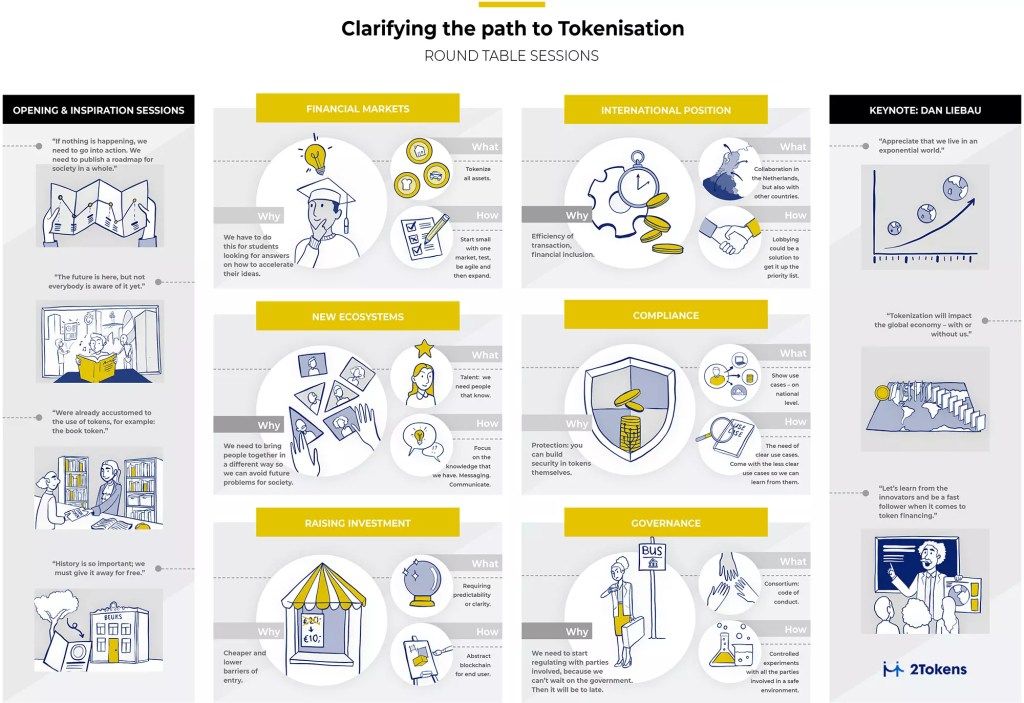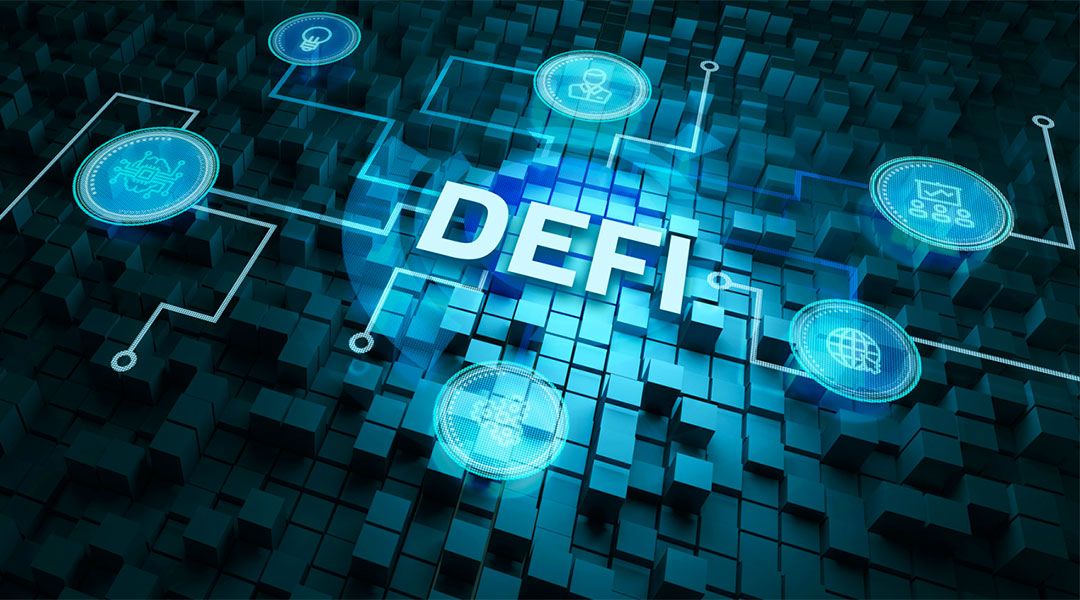Clarifying the Path to Tokenisation

Recently, I got involved in the 2Tokens project. The 2Tokens project aims to clarify the path to realising value from Tokenisation. In the 17th century, The Netherlands transformed the economic landscape with the invention of the stock market. Our assertion is that tokenisation represents as fundamental a shift for the 21st century, but insufficient initiative is taking place to realise the benefits for The Netherlands.
Ultimately this is a guide on how to realise value from Tokenisation, first surfacing up challenges with the current legal & regulatory environment and helping to motivate the changes needed. The first phase of the project is focused on gathering insights, challenges and suggestions – arranging three Round Table sessions to understand how The Netherlands should deal with token financing and tokenisation in general. The Netherlands is well-positioned to play a leading role in the transition to decentralisation, even though the challenges are diverse – but much more action as well as better legal/regulatory clarity is needed.
On November 6, 2019, the 2Tokens project organised the first round table session, at De Nieuwe Littéraire Sociëteit De Witte with approximately 60 attendees. From the feedback, it is clear that the event was a great success. There were lively discussions at the different tables and the participants enjoyed the in-depth knowledge that was shared across the different discussion slots.

The session was split into three phases, with each table focusing on a separate “theme”. The first phase was focused on the Why we need tokenisation. The second phase was about What we need to do to achieve tokenisation and in the third phase, the focus was on How to move ahead with Tokenisation.
Why we need tokenisation
Although the six tables each looked at tokenisation from a different perspective, the reasons why we need tokenisation were very much aligned:
New Financing Models
Tokens allow companies to obtain funding in new, innovative ways, that are often cheaper, more effective and faster. Tokenisation can replace the current crowdfunding methodology as token funding will be more secure, transparent and effective. If companies can fund their initiative faster, it is beneficial to the competitiveness of The Netherlands and Europe.
Tokenisation lowers the barriers of entry for raising capital. Not only because it is faster and cheaper to organise, but also because there is a wider investor reach. As a result, companies and startups can build an ecosystem faster with tokens, while still involve all stakeholders. In addition, tokenisation will make any financial transaction cheaper (i.e. settlements between various banks).
Interchangeability, liquidity and programmability
Tokens offer some unique features compared to traditional securities. Fungible tokens are interchangeable and can be divided into smaller token units. Tokens are programmable, and they offer new opportunities for companies to be more flexible with regard to ownership, voting rights, dividends and financing. It becomes possible to embed the rules of shareholders and corporates into the tokens, as to that they are automatically enforced. This will drastically affect the core of what a legal entity is.
Tokens will also have a profound effect on liquidity in the world’s economy as tokens enable fractional ownership. This enables small investors anywhere in the world to invest in anything, starting from a few cents. Anyone anywhere can become a shareholder in anything that is tokenised. Tokens will democratise finance. Fractional ownership will open up the world’s illiquid assets and make assets such as real estate highly liquid. This will have a profound effect on the world economy.
Transparency, Security and Compliance
Tokens can make financial transactions cheaper, faster, more secure and it offers more transparency to understand transactions across stakeholders. Tokenisation will bring trust amongst stakeholders since agreements can be put into smart contracts and put on chain to automatically execute them.
More importantly, compliance can be enforced automatically since the rules of the game can be embedded in the code. For example, shareholders agreements can be programmed into the token and, consequently, governance will be done automatically. This will remove frictions in the economy and reduce the cost of transactions.
What Do We Need to Do to Achieve Tokenisation
The importance of tokenisation was quite clear to all the participants. Tokenisation is the future and if The Netherlands would not adopt favourable regulations it could become less competitive and lose out on promising startups who settle somewhere else. The next round in the discussions was to understand what The Netherlands needs to do to achieve tokenisation. What are the requirements for the Dutch ecosystem in order to benefit from tokenisation?
Clear Definitions and Standards
Above all, we need standards. Standards in regulations (not only The Netherlands but also across Europe), technology and audits. To achieve standards, we first need clear definitions of tokenisation (since many people have a different definition) and tokens need to get a clear legal status, similar to what has been done in Liechtenstein.
To achieve this, The Netherlands cannot act alone but should aim to achieve change on a European level. Tokens do not adhere to borders, so regulation works only when done at a supra-national level. This will remove system risks and will, eventually, lead to clear ICO/STO frameworks for organisations. A check-list and/or decision tree for organisations willing to do a token sale will help compliance and speed up innovative funding initiatives. Once there are clear definitions and standards, organisations can receive a seal of approval for their token offering thanks to trustworthy audits.
Education and Talent
The token ecosystem still needs to be developed and there is a lot of misunderstanding to tokenisation. Therefore, we need education of all stakeholders and we need to grow the pool of talent in The Netherlands. More people need to understand tokenomics and token engineering and young people need to learn about tokenisation during studies (Bachelor or Masters). It is necessary that organisations can get access to deep expertise from a variety of relevant disciplines.
First Movers
Tokenisation requires first movers. First movers in the investment landscape as well as first movers in the startup scene. Tokenisation requires a different approach and, still, comes with a lot of uncertainty. Those countries that encourage first movers adoption of tokens will remain competitive. Startups need to develop lighthouses/uses cases, but investors need to be willing to buy those tokens and fund decentralised initiatives.
The government can play a role here by developing favourable regulation for investors. Those investors who do want to invest need to see the secondary value that can be achieved with tokenisation.
Self-Sovereign Identity as an Enabler for Decentralisation
Self-sovereign identity is becoming a key enabler for the decentralised ecosystem. It gives back control to the user and gives power to the people. However, there are many challenges when it comes to self-sovereign identity. Regulation needs to help citizens adapt to the new digital reality that is emerging. Standard protocols and a well-developed infrastructure will be important for self-sovereign identities. Once citizens have full control over their data and identity, it will drive decentralised applications.
How to Move Forward with Tokenisation
Understanding why we need tokenisation and what we need to do to achieve tokenisation are the first steps. Eventually, we need to have the right infrastructure to move forward with tokenisation. The third session of the day was focused on the How and what we require to become successful with tokenisation in The Netherlands.
Sandbox, sandbox, sandbox
All tables agreed that to move forward, we need a sandbox, where organisations, regulators and governments can experiment with the new digital reality of tokens. The Dutch Financial Authority (AFM) has a sandbox for financial innovation, but it is very difficult for organisations to become part of it. The AFM should open up their sandbox to co-create innovative token solutions. If The Netherlands develops a flexible and inclusive sandbox, it can become an important differentiator in the wide token ecosystem. In fact, it can make The Hague a digital hub when it comes to tokenisation.
Lobbying through Education
Organisations such as the 2Tokens project should lobby the government to make clear what The Netherlands will miss if we do not move ahead with tokenisation. Lobbying will help tokenisation become a priority for the Dutch government and the regulators. However, lobbying alone is not enough, because lobbying only works if the government understands the importance of tokenisation. Therefore, education is key.
Education can be achieved by developing e-books, (online) courses, have 2Token ambassadors, organise events and ensure close collaboration on various levels of the government.
Collaboration and Clear Use Cases
Apart from raising awareness and explaining the benefits of tokenisation, the best approach is to show the benefits of tokenisation. Therefore, we need clear, real-world examples that are backed by regulatory compliance. Several case studies, where there is a close collaboration between startup, government, regulators and the financial industry will help to understand the impact of tokenisation and see the benefits of it. Using clear examples we can show what The Netherlands would miss out (FOMO) if no action is taken. The closer the collaboration between different organisations the bigger the impact of lighthouses/use cases.
When creating clear use cases – with seamless user experience – with wide involvement of various stakeholders, any learnings should be disseminated across the industry and government. That way, we can learn from failure. A national sandbox will help in developing strong uses cases where there is close collaboration between governments and startups. However, as mentioned, collaboration should not only happen on the national level but also on the supra-national European level.
Conclusion
The first round table session was a great success by providing a shared understanding of why we need tokenisation, what we need to do make tokens common ground in The Netherlands and how we can achieve that.
The second round table discussion will take place on January 14, where we will take a deep dive into purpose-driven tokenisation and how tokens can be used to build ecosystems. you can register here.
The final round table will take place on February 11th, where we will take a deep dive into all aspects of Token Financing. If you would like to contribute and/or engage on this topic then please indicate your interest to join, you can register here.
Image: Skorzewiak/Shutterstock





